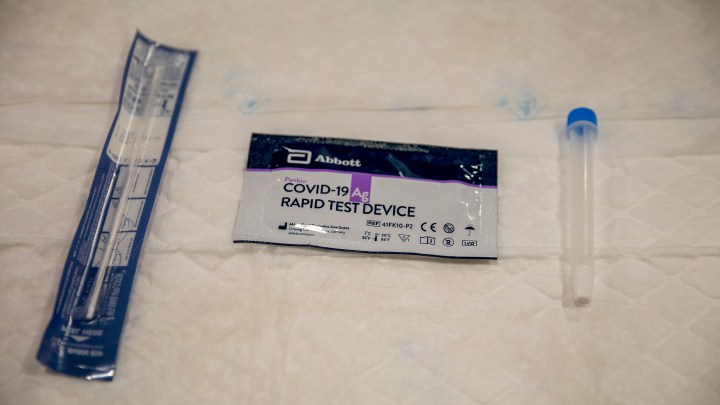
$5 COVID test, DIY-style, may be on the way

As coronavirus vaccinations begin and economies around the world seek new ways of opening up safely, a new kind of virus test stands on the verge of going big: a half-hour, at-home test you can do without a prescription.
Price tag: around $5.
They’re known as rapid antigen tests. Right now, there is no cheap, at-home version available in the United States without a prescription, but several applications are in the queue before the Food and Drug Administration.
One country leading the effort to deploy rapid antigen tests is the United Kingdom, where Marketplace’s editorial partners at the BBC use them. In the course of reporting this story, I spoke with BBC reporter Vishala Sri-Pathma as she was doing one herself.
“So you open your mouth wide and you rub the fabric tip of the swab over both your tonsils. So I’m just gonna do that now,” Sri-Pathma told me over Zoom audio. She then swabbed her nose, stuck the swab into a tiny vial of liquid and dripped the solution into a simple plastic device that she said resembled a pregnancy test.
“So you’ve got to squeeze very carefully, two drops,” Sri-Pathma said. “OK.” And that was it. The results would come in half an hour.
The quick antigen tests use what’s called lateral flow technology, as the liquid sample travels along a lateral strip inside the device. The U.K. government wants to send these tests around the country, in a campaign that began last fall in Liverpool.
“It’s only three weeks ago that we had 680 people per 100,000 COVID positive,” Liverpool Mayor Joe Anderson said in a mid-November interview with Channel 4 News in the U.K. “That is down to below 300. And it means that there’s less pressure on our ICU units.”
How does this test work? Whereas lab tests known as PCR are designed to turn up genetic footprints of the virus, antigen tests hunt for proteins produced during an active infection.
“It’s really a contagiousness test,” said Mara Aspinall, professor of practice in biomedical diagnostics at Arizona State University. She noted that antigen tests provide speedier results than PCR, which can take days.
“If you take it 15 minutes before you go see a higher-risk person, it is highly, highly likely that you are not contagious,” Aspinall said.
There are trade-offs. Studies have found antigen tests miss some cases that are picked up by PCR tests. There is a heated debate among scientists as to how relevant — or marginal — those missed cases are.
Also, a person conducting a rapid antigen test at home may not know how to respond to a positive result.
“It may induce panic,” said immunologist David Harris at the University of Arizona, “and the individual says, ‘Now I’m infected and I’m gonna die.’ And they rush into the already overwhelmed medical system. At least half the people who get infected never need medical care.”
Harris oversees daily antigen testing for the university football and basketball teams. “The only positives we’ve had on either teams have been coaches,” he said.
Workers at factories, supermarkets and airports also take these tests in countries including the U.K. And there are other potential economic possibilities.
“Opening schools, opening mines,” said Sergio Carmona, chief medical officer at the Foundation for Innovative New Diagnostics in Geneva. “And border crossings where truck drivers would need to cross and deliver goods.”
There’s a lot happening in the world. Through it all, Marketplace is here for you.
You rely on Marketplace to break down the world’s events and tell you how it affects you in a fact-based, approachable way. We rely on your financial support to keep making that possible.
Your donation today powers the independent journalism that you rely on. For just $5/month, you can help sustain Marketplace so we can keep reporting on the things that matter to you.


















